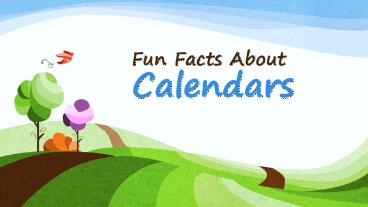Do You Know These Interesting Facts about Calendars? - PowerPoint PPT Presentation
Title:
Do You Know These Interesting Facts about Calendars?
Description:
Go through this show and enjoy never heard interesting facts during the evolution period of calendars. – PowerPoint PPT presentation
Number of Views:142
Title: Do You Know These Interesting Facts about Calendars?
1
Fun Facts About Calendars
2
How did the word Calendar came into existence?
- The word calendar comes from the Latin word,
Kalendae, which means the first day of the
month.
3
Who introduced Gregorian calendar to the world?
- Gregorian Calendar, the most commonly used
calendar today, was introduced by Pope Gregory
XIII. This was because the previously used Julian
Calendar was off by 11 minutes, causing the
calendar to fall out of sync with the seasons.
4
How does the Gregorian calendar differ from the
Julian calendar
- In the Julian calendar, every year divisible by 4
is a leap year. However, in the Gregorian
calendar, there is an exception century years
are not leap years, unless divisible by 400. This
was done to offset the miscalculated 11 minutes.
5
Why does the Gregorian calendar differ from the
Solar year by 26 seconds?
- The exact time it takes for Earth to complete one
revolution is 365 days, 5 hours, 10 minutes and
48 seconds. By adding a leap day every 4th year,
a difference of 26 seconds arises.
6
When was the new year celebrated before the
adoption of the Gregorian calendar?
- Before adopting the Gregorian calendar, the
English new year was observed on Lady Day, March
25th, which celebrates the Virgin Mary.
7
When and Why did Sunday became the day of rest?
- Roman Emperor Constantine chose Sunday as the day
of rest and prayer in the year 321. He did so to
please both Christians (Sunday marks resurrection
of Christ) and Pagans (who worshiped the sun
gods) in his empire.
8
When and Why did Sunday became the day of rest?
- Roman Emperor Constantine chose Sunday as the day
of rest and prayer in the year 321. He did so to
please both Christians (Sunday marks resurrection
of Christ) and Pagans (who worshiped the sun
gods) in his empire.
9
How did the months of the year get their names?
- January Named after Janus, the God of beginnings
and endings - February Named after the festival Februa, a
period of celebration - March Named after March, the Roman God of War
(Originally March was the first month. January
and February were added later by Numa Pompilius) - April There are three theories behind Aprils
naming - It is the Latin word for second
- Derived from Latin word, Aperire meaning, to
open, representing the opening of buds in spring - Named after Roman Goddess, Aphrodite
- May Named after Maia, earth goddess of growing
plants - June Named after Juno, the queen of the gods and
patroness of marriage and weddings - July Named after Julius Caesar in 44 B.C.
10
Is 13th more likely to fall on Friday than on any
other day of the week?
- Yes, 13th of every month is more likely to fall
on Friday than any other day of the week, 688
times every 400 years to be precise. This is
because after three 28-year rotation cycles, the
last 12 calendars repeat themselves. Since 1st
January of the 13th year falls on a Saturday, the
distribution symmetry of days is disrupted.
11
What are other calendar systems that exist in the
world?
- Gregorian calendar is the most widely used
calendar in the world. However, it isnt the only
one in use. There are 6 other regular calendars - The Chinese calendar
- The Hebrew Calendar
- The Islamic Calendar
- The Persian Calendar
- The Ethiopian Calendar
- Te Balinese Pawukon
12
What are other calendar system exist in the world
- Calendars fall into three types
- Lunisolar
- Solar
- Lunar.
- Gregorian calendar is a type of solar calendar,
based on earths revolution. - Calendars like the Islamic calendar are lunar
calendars that are based on phases of the moon. - Hebrew and Hindu calendars are types of lunisolar
calendars which are based on movement of both,
the Sun and the Moon.
13
I am Jayden Samuelson, an online marketing expert
and a regular contributor to Promo Direct Go
for promotional calendars if you want to help
recipients better plan out their schedules.
If you have any question, get in touch with me
at Google, Twitter and Facebook































